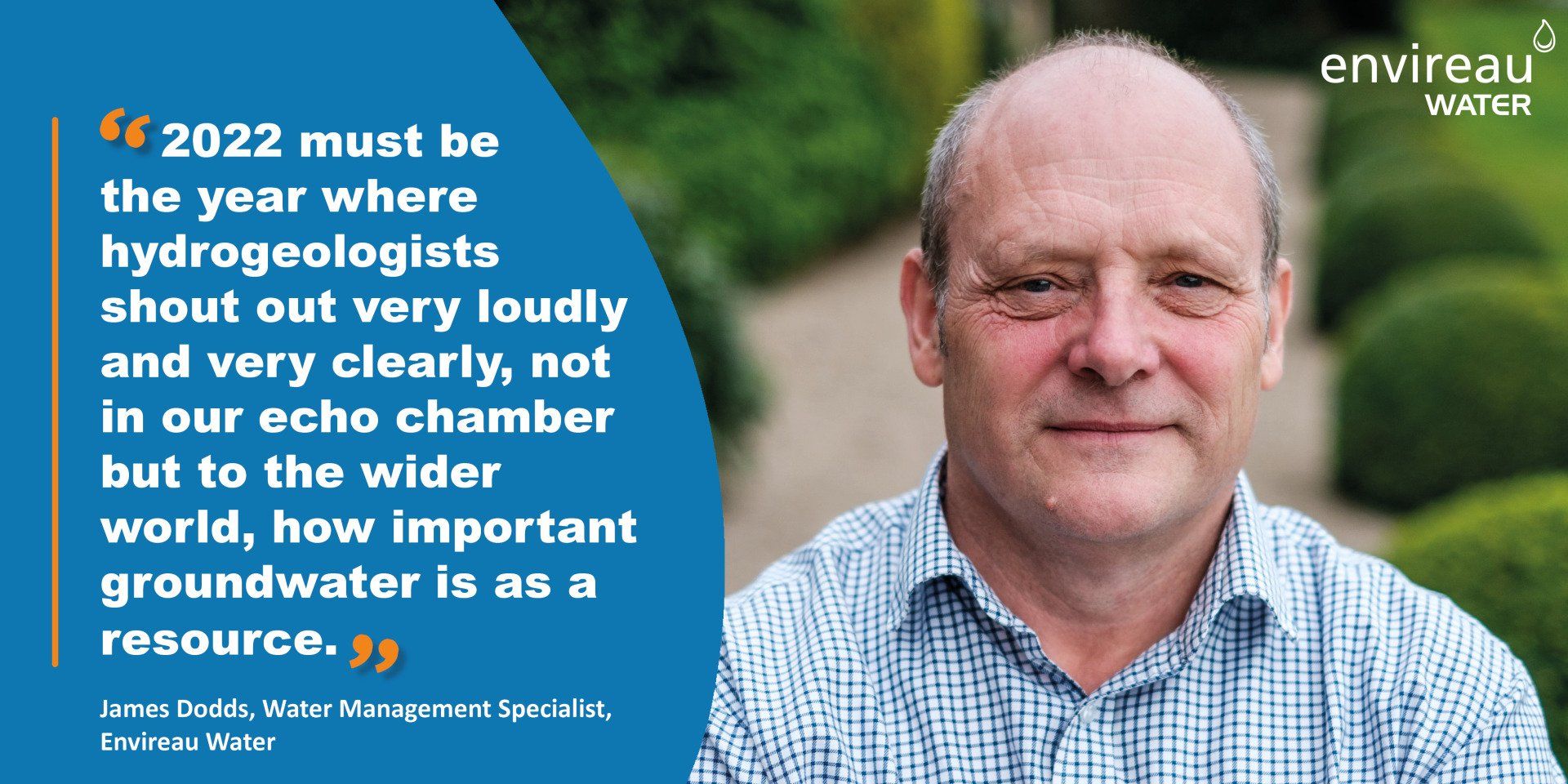2022 New Year Missive: Groundwater - Making The Invisible Visible
2021 was a big year for Envireau Water. When I wrote last year’s missive, I had no idea that by the time I was writing this one, the company would be owned by someone else. Joining the RSK family is an important step for Envireau Water, it gives us access to a wide range of expertise and experience to enable us to deliver even more solutions in the way for which we are renowned.
Will 2022 be more of the same? Viruses, political games and uncertainty – probably, but there isn’t much we can do about that. However, there is something that we can change. The theme of the UN-World Water Day on 22nd March is “Groundwater: making the invisible visible”. This gives the opportunity to raise awareness of groundwater, the role that it plays in the water cycle and water resources management, its unique processes and how it links many hydro-ecological settings. Various groundwater-related groups are extending the theme across the year, to make 2022 The Year of Groundwater.
This brings me back to sustainability and balance, a topic that I dwelt on last year. To manage a groundwater system, one must understand its physical and chemical properties. While understanding groundwater systems isn’t difficult (it can’t be if I can do it), collecting data, evidence and conceptualising it, is. It is in the large part invisible. Invisibility and other attributes make groundwater systems very different from surface water systems, and these differences mean the two systems must be managed differently. They operate in space and time in different ways, which when working together make them powerful. It might be facetious to suggest that surface water systems are easy to manage, you can see and measure them after all, but the invisibility of groundwater results in either it being forgotten, managed analogously to surface water, or being ‘left in the ground’ as its too difficult to think about. 2022 must be the year where hydrogeologists shout out very loudly and very clearly, not in our echo chamber but to the wider world, how important groundwater is as a resource. A resource that must be protected and managed, but as importantly - used.
Through 2020 I caught up with a couple of professional friends via Teams to discuss topics of mutual interest. These chats often explored the subject of ‘bias’ and at one point we seriously looked at convening a conference around the subject, exploring bias in hydrogeological conceptualisation and regulation. The conference idea remains on the back burner, but the concept of bias remains very much at the forefront of my mind. Bias stops us from seeing what is in front of us. It affects experts as well as technical laypeople. Indeed, some would argue that the more expert you are (or you think you are) the more susceptible you are to several types of bias (ref. The Intelligence Trap. David Robson 2019). Bias is a complex subject, and I don’t intend to explore it here, but it works on all levels from the individual, through groups and teams to the institutional and corporate. One of the consequences of bias is the lack of actively open-minded thinking, intellectual humility and the ability to competently reflect on our gut feelings by cross-checking them with data and analysis. In essence, a critical way in combating bias in science (yes, hydrogeology is a science) is by balancing different evidence and data sets to come to a justified level of understanding. Lacking data and evidence makes this impossible.
Envireau Water has a hard-earned reputation for challenging regulators and 2021 has been no different. What has been different is some of the things that we have been challenging and the basis of the challenges. Almost universally we have been challenging ‘decisions’ made prior to applications being made; diktats made with huge consequences but based on a narrow (biased) view, with little or no hard evidence. To be fair this has always been the case, but the tendency we are seeing is that the regulatory mind is closing. There is no intellectual humility, there is no competent reflection. This may be driven by technical arrogance, a lack of funding, a lack of human resources or many other factors; but the consequence is a lack of balance, and a lack of balance will lead to decisions that lead to environmental damage, a lack of sustainability and potentially irreversible errors. There are many references in commerce and industry where this closed mind, institutional bias leads to disasters, including the 2008 banking crisis, as well as the Deepwater Horizon and space shuttle disasters. It is critical that environmental regulators find ways to open their technical minds, to find intellectual humility and to find balance.
Recognising and understanding where groundwater fits into the water cycle, being honest about what we know and what we don’t know, what matters most and what matters less, how we can gather evidence based on data and how we can test our working hypotheses or conceptual models will help us understand the difference between effects and impacts. Only by maintaining a rigorous scientific approach, both within and outwith the regulatory sector can we judge whether ‘reasonable scientific certainty’ is reached.
Envireau Water has always strived to provide evidence-based analysis across the wide range of sectors that we work with. This won’t change in 2022, but what will change is the way we challenge ourselves, our clients and the regulatory system to see the technical and scientific biases in the work, policies and decision-making processes. This will require foresight, resources and collaborative approaches, between all the project stakeholders. Envireau Water will use our opportunities in the 2022 Year of Groundwater (#MakingInvisibleVisible) to illustrate how we can achieve balance in the management and protection of our critical groundwater resources by recognising bias and finding ways to reduce it, to make our decisions wiser.
As 2021 slips away, Phil, me and everyone at Envireau Water hope that whatever you have planned for 2022 works out; that the unplanned events at least have positive outcomes; and that from a water-related point of view if you cannot see your way through the technical and regulatory maze, that you will give us a call – if nothing else, I’m more than happy to have a totally biased discussion to get the frustration off your chest!
Ah, I nearly forgot the weather for 2022… writing this on the warmest New Year’s Eve on record, the balancing act will strike, and we’ll be in for an Easter chill; late spring and early summer will bring sunshine and high temperatures followed a damp squib of a summer and early autumn. Autumn storms will lead to a seasonal winter, a bit on the cold side but with some sunshine. There we go, don’t plan your holidays or plant your crops by it, and only one thing is for certain – it will be whatever it is, and there is absolutely nothing you can do to change it.
Happy New Year.









